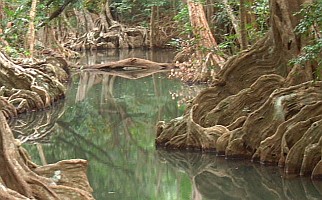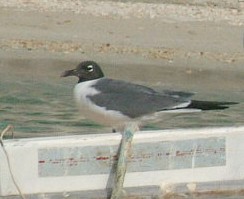
Dense ficus and mangroves line the Indian River
|
Flora & Fauna Areas West Indies Flora/Fauna Related Pages Windward Islands HomeLeeward Islands Home |
West Indies Flora/Fauna
This section highlights some of the interesting plants, animals and birds of the West Indies.
 Dense ficus and mangroves line the Indian River |
The term West Indies refers to the islands of the Eastern Caribbean from the Dominican Republic and Haiti, through the British and US virgin Islands, south to Grenada.
The eco-regions of the Eastern Caribbean islands range from semi-arid to rainforest, and correspondingly from low sandstone formations to high volcanic mountains. With the exception of a few endemic birds (such as the St. Lucia Parrot and Martinique Oriole) that are found on only one island, the flora and fauna in similar eco-regions differ little from island to island. Many of the plants (especially the ornamentals and food crops) were imported centuries ago. Same with some of the animals. If we know the origins, we'll mention them. We sailed through the West Indies before we had an underwater camera so we had to rely on what we could, in good conscience, bring up from the bottom. So check out our Caribbean underwater page, and see some of the animals and shells of the West Indies.
 Laughing Gull, St. Vincent |
The Eastern Caribbean is on the migratory flight paths of many North American birds, and as such there are many here that we recognize even from the West Coast. Others come from South America. The few endemic (island-specific) birds are rare, and we've not seen any of them yet! For more on the birds, see Sue's West Indies Birds pages.
On the linked pages are a few of the plant and animal species that we've seen and identified.
On board we have a copy of
Collins Guide to Tropical Plants by
Lotschert and Beese which covers tropical plants around the world. We also use
A Guide to the Birds of the West Indies
by Herbert Raffaele, James Wiley and others.
| Getting to the West Indies Most of the islands are easily accessible from Miami and New York by air. The Dutch and French islands have daily flights from Europe. If you charter a boat you'll have a good chance of seeing marine mammals and sea birds. On land, ask about eco-tours into the forested interiors of the volcanic islands. Self-driving is a good option on most of the larger islands. |
Here's a bit of trivia for movie and birding buffs -- Where did Ian Fleming get the name for his macho hero, 007? Why, from the author of one of the first Birding Guides to the West Indies -- James Bond! This is actually illustrated in the James Bond classic, Die Another Day, when Pierce Brosnan (Bond) picks up and briefly looks at James Bond's bird book in Cuba.
Which West Indian Islands do you want to visit for a birding or nature tour? If you're looking for more than sun and sand, you'll want to consider the natural geographic features. The Eastern Caribbean basically breaks down into two distinct eco-regions. There are many tall, lush volcanic islands with rainforest and large rivers, including Puerto Rico, Saba, St. Kitts and Nevis, western Guadeloupe, Dominica, Martinique, St. Lucia, St. Vincent, Grenada, and Trinidad and Tobago. Other islands are low and sandy with semi-arid landscape and habitat. These include the US and British Virgin Islands, Antigua, St. Maarten, St. Barths, Anguilla, eastern Guadeloupe, The Saintes, and the Grenadines of both St. Vincent and Grenada.
Top Level: Home | Destinations | Cruising Info | Underwater | Boat Guests | Ocelot | Sue | Jon | Amanda | Chris | Site Map | Make a Comment
|
If our information is useful, you can help by making a donation |
Copyright © 2000‑ Contact: Jon and Sue Hacking -- HackingFamily.com, svOcelot.com. All rights reserved.